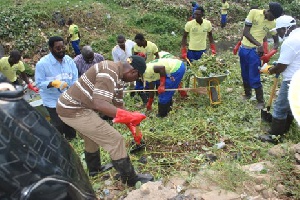Mr Akwasi Opong-Fosu, Minister of Local Government and Rural Development has directed the Metropolitan, Municipal and District Assemblies (MMDAs) to institute bye-laws to prohibit the construction of open drains.
He said the MMDAs must ensure that the existing ones are covered to curtail the dumping of waste into them.
Mr Opong-Fosu said the raining season that is always accompanied by floods causing destruction to human lives and property had started, hence the need for the directive.
The Minister who gave the directive when he partook in a clean- up exercise in Accra on Friday, asked the MMDAs to organise periodic clean up exercises to clear refuse dumbs and distil choked drains to allow free flow of rainwater.
He said the clean up exercise would not be a nine-day wonder because sanitation issues are the priority to the government.
“The Ministry intends to mobilise students on holidays for clean-up campaigns as part of measures to improve sanitation prior to the raining season,” he stressed.
Mr Alfred Okoe Vanderpuije, Accra Metropolitan Chief Executive said due to lack of adequate infrastructure and mismanaging of existing ones, rainwater do not get to its destination finding its way into homes.
“Preparations like these clean up exercises are very crucial prior to the unset of the heavy rains to ensure that the status quo of flooding caused by choked drains are averted this season,” he added
Mr Julius Debrah, Greater Accra Regional Minister appealed to the media to help disseminate information on the planned clean up exercises prior to the raining season.
“The mass campaign of freeing drains to prevent flooding requires all hands on deck, therefore when the announcements are made, all must endeavour to get involved,” he added
Mr Owura Sarfo, Managing Director of the Accra Compost and Recycling Plant Limited indicated that more than 2500 tons of solid wastes are generated in Accra everyday, but only 60 per cent of it are collected.
“The remaining 40 per cent lives with us in our localities, in drainage systems, the sea. The positive thing about this is that 50 per cent of waste generated are organic, which this facility decomposes to generate organic fertilisers for agricultural purposes,” he added.
According to him, his organisation is finding it difficult getting lands for dumpsite because of rapid urbanization.
He said most lands had been acquired for residential purposes.
Regional News of Saturday, 6 April 2013
Source: GNA













